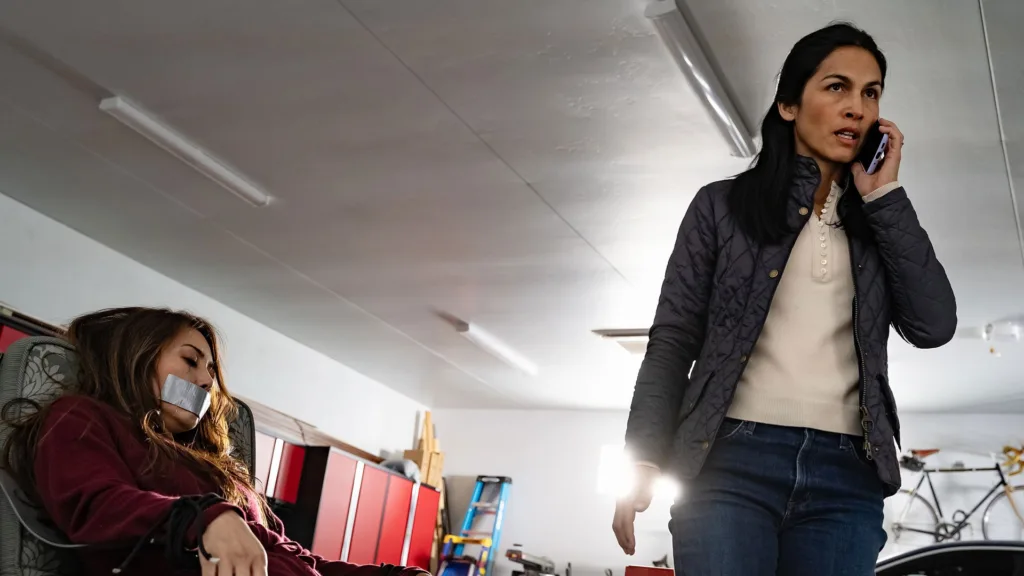“The Cleaning Lady” reintroduces us to Thony De La Rosa, a Cambodian doctor whose American sojourn, initiated by the urgent need for her son Luca’s medical care, spiraled into the shadowy service of a crime syndicate. This series has consistently positioned Thony at an uneasy intersection of maternal devotion and criminal complicity.
Season 4 commences with a familiar promise of change, a recalibration of Thony’s perilous existence. The central drama intensifies: Thony’s relentless campaign for her family’s legitimate place in the United States now unfolds against her potential ascent within the very organization that threatens her peace.
Early scenes dangle the prospect of visas, a reward mediated by FBI Special Agent Katherine Russo for Thony’s part in the apprehension of cartel figure Ramona Sanchez. This glimmer of conventional resolution, however, feels almost deliberately fragile in a narrative world built on precariousness.
Ascending the Underworld: A Doctorate in Dangerous Deals
Thony’s arc this season signals a departure from primarily reactive survival towards a more deliberate assertion of agency. No longer content to merely navigate the currents of cartel politics, she appears poised to redirect them. The abrupt assassination of Agent Russo extinguishes the flickering hope of legal status, plunging Thony and her kin into an even more desperate situation and forcing a stark reevaluation of her strategy.
Her son Luca’s poignant observation—”If you run, the bully wins”—becomes the quiet catalyst for a bolder stance, prompting Thony to confront the formidable Ramona Sanchez directly in her prison confines. This encounter sets a new tone for their dynamic; Ramona, ever the puppeteer even behind bars, dangles the visa carrot anew, contingent on Thony brokering a meeting with her estranged brother, Jorge.
Thony’s subsequent entanglement with Jorge, who himself is attempting to steer parts of the cartel towards legitimacy, is deepened when her medical skills become indispensable during an attack, leading to her audacious proposal to serve as the cartel’s physician.
One questions if this pursuit—be it for professional reinstatement, for leverage, or for simple survival—represents an authentic empowerment for an immigrant woman on screen or a more elaborate, gilded cage.
The American Dream Deferred: Collateral Damage in the Cartel’s Shadow
The reverberations of Thony’s choices send tremors through the De La Rosa household, where the dream of American legitimacy seems perpetually just out of reach. Fiona, Thony’s sister-in-law, grapples with the evaporated promise of visas and Thony’s deepening immersion in criminality.
Her own efforts to sustain the family through their shared cleaning business, a small island of legitimacy, are juxtaposed with a growing maternal resolve, especially concerning her son Chris. The young man, chafing under the weight of his undocumented status, makes a rash decision involving valuable jewelry—a remnant of a past character, Nadia, now gifted to Fiona—in a desperate bid to reach his girlfriend in Los Angeles, an act that brings unwelcome official attention.
Even Luca’s childlike wisdom, a moment of pure moral clarity, underscores the complex compromises his mother makes. The narrative tightrope here is whether the foundational theme of familial bonds, once the series’ poignant anchor, can withstand the escalating pressures, or if these relationships become mere subplots to a grander, perhaps more conventional, crime saga. The potential for an internal schism, particularly between Fiona’s yearning for a life outside the law and Thony’s increasingly ambiguous path, adds a layer of domestic tension.
Recalibrating the Narrative: Progress or Pitfalls in Prime Time?
With a new showrunner, Season 4 of “The Cleaning Lady” appears to be actively reshaping its narrative identity. The question is whether this constitutes a meaningful evolution or a hesitant shuffle into well-trodden genre territory. Themes of power, ambition, and the immigrant experience are certainly present, yet their exploration sometimes feels overshadowed by the mechanics of the thriller.
One observes, with a degree of academic curiosity, the emergence of character attributes—Thony’s sudden fluency in French, Chris’s apparent development into a dancer with sequences reportedly peppering episodes—that seem to materialize without prior groundwork. Such narrative choices prompt a query: are these organic developments, or do they hint at a kind of scriptwriting shorthand, perhaps a symptom of broader industry trends where character depth is occasionally sacrificed for episodic novelty?
The series’ engagement with complex societal issues, like the arduous process immigrant doctors face for relicensing, risks feeling superficial if, for example, a “machine trade” is presented as an equivalency for medical qualification. Similarly, the depiction of the Southeast Asian community demands careful handling to avoid reducing individuals to props in a crime drama, a concern that lingers when shows centered on marginalized groups tilt heavily into criminality without sufficient counter-narrative.
The balance between the intimate family drama that initially defined Thony’s struggles and the expanding cartel storyline is delicate. If the latter comes to dominate, the series might lose the specific cultural texture that made its premise noteworthy, becoming yet another story where diverse faces populate familiar structures.
The path Season 4 carves will speak volumes about its understanding of its own potential and its responsibilities in a television landscape hungry for, yet often fumbling, authentic representation. What unfolds will determine if Thony’s journey offers fresh insight or becomes a cautionary tale of a promising narrative losing its distinct voice.
The Cleaning Lady Season 4 premiered on March 25, 2025, on FOX, continuing the gripping narrative of Thony De La Rosa as she navigates complex moral dilemmas and the criminal underworld.
Full Credits
Directors: Timothy Busfield, Romeo Tirone, Melissa Carter, Lou Diamond Phillips, Alan Caudillo, Mo McRae, Élodie Yung, Ramaa Mosley
Writers: Daniel Cerone, Kelli Breslin, Eddie Serrano, Helen Childress, Thomas Wong, Joelle Luman, Noah Schechter, Patrick Emralino
Producers: Stewart Lyons, Joe Lotito, Michael Notarile, Hynndie Wali, Élodie Yung, Suzanne C. Geiger
Executive Producers: Miranda Kwok, Paola Suárez, Rose Marie Vega, Jeannine Renshaw, Daniel Cerone, Shay Mitchell, David Dean Portelli, Michael Offer, Timothy Busfield
Cast: Élodie Yung, Martha Millan, Khalen Roman Sanchez, Sean Lew, Faith Bryant, Santiago Cabrera, Kate del Castillo, Ryan Sands, Yancey Arias, Daniel Bonjour, Alain Uy, Patricia de León, Rita Volk, Robert Cicchini
Cinematographers: Marshall Adams, Vanessa Joy Smith, Alan Caudillo, Juergen Heinemann, Ana Amortegui, Paul Elliott
Editors: Luyen Vu, Diva Magpayo, Dan Downer III, Mats Abbott, Lois Blumenthal, Richard Glazerman, Lane Baker, Joshua Carrillo, Shonnard Hedges, Elena Maganini
Composers: Mark Isham, Allison Cantor, Diwa de Leon
The Review
"The Cleaning Lady" Season 4
"The Cleaning Lady" Season 4 propels Thony into a more assertive role, offering a potentially dynamic shift in her struggle for agency. However, this empowerment is shadowed by concerns about narrative coherence and the depth of thematic exploration, particularly regarding the immigrant experience and family dynamics. The season balances on a fine line, its moments of genuine tension and character strength occasionally undermined by choices that risk oversimplifying its complex premise or diluting its distinct cultural voice. It remains a series with a potent setup, though its current trajectory invites scrutiny.
PROS
- Thony’s development towards a more proactive, assertive character.
- The underlying tension of an immigrant family striving for security.
- Intriguing power dynamics within the cartel structure.
CONS
- Potential for narrative inconsistencies and unearned character developments.
- Risk of superficial engagement with significant social themes.
- The core family story is sometimes overshadowed by crime genre conventions.
- Questions surrounding the authenticity and depth of cultural representation.

















































